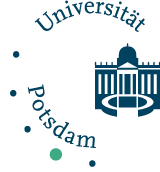Doctoral Researchers

Raffael Hanschmann
Master of Politics and Public Administration
Campus Griebnitzsee
DFG-Research Training Group "WIPCAD"
University of Potsdam
Department of Economics
and Social Sciences
August-Bebel-Straße 89
14482 Potsdam, Germany
Office: Campus Griebnitzsee, House 7,
Room 3.07.211-15
Research topic
“The impact of the economic crisis on EU climate policy-making”
Curriculum vitae
EDUCATION
09/2012 – 09/2014
Master of Arts, Politics and Public Administration, University of Konstanz
09/2013 – 08/2014
Master of Science, Public Administration, Leiden University
09/2008 – 08/2012
Bachelor of Arts, Politics and Public Administration, University of Konstanz
ACADEMIC WORK EXPERIENCE
05/2014 – 08/2014
Student Assistant, Chair of Empirical Theory of Politics (Prof. Dr. Knill), Ludwig Maximilian University of Munich
- Research project CONSENSUS 2.0
09/2013 – 03/214
Student Assistant, Chair of Comparative Public Policy and Administration (Prof. Dr. Knill), University of Konstanz
- Research project CONSENSUS 2.0
09/2011 – 03/2012
Student Assistant, Chair of Comparative Public Policy and Administration (Prof. Dr. Knill), University of Konstanz
- Research project MORAPOL
TEACHING EXPERIENCE
10/2012 – 02/2013
Teaching Assistant, Chair of Comparative Public Policy and Administration (Prof. Dr. Knill), University of Konstanz
- Tutorial for the lecture “Introduction to Policy Analysis”
RESEARCH INTERESTS
- Environmental Policy and Politics
- EU Politics
- Policy network analysis
AWARDS AND HONOURS
Jan Brouwers Thesis Prize
For a social science Masters thesis handed in at the Institute of Public Administration, Leiden University (Title: The impact of the economic crisis on EU environmental policy-making – insights from discourse network analysis).
The prize is awarded by the Royal Holland Society of Sciences (Koninklijke Hollandsche Maatschappij der Wetenschappen, KHMW) and endowed with 2.000 Euro. It is awarded for outstanding theses in the disciplines of philosophy and theology, linguistics and literary studies, history, jurisprudence, economics, social sciences, and humanities. The winner in each discipline is selected by a jury among theses submitted by faculties of all Dutch universities.
Publications
Hanschmann, R. (2016). The Crisis-Induced Polarisation of EU Environmental Policy-Making. Paper presented at the 2nd International Conference on Public Policy (ICPP), 1-4 July 2015, Milan.
Knill, C., Steinebach, Y., Hanschmann, R., Bianculli, A. C., Jordana, J., Juanatey, A. G. (2014). Social and Environmental Policies in Hard Times: Buffering Economic Pressure by Policy Dismantling? Paper presented at the 5th ECPR Regulatory Governance Conference, 25-27 June 2014, Barcelona.
Abstract
The impact of the economic crisis on EU climate policy-making
Raffael’s dissertation looks into the impact of the economic crisis on EU climate policy-making. The recent economic, fiscal and debt crisis has been dominating EU politics since 2008. At the same time, the EU considers itself a forerunner in combating the “wicked problem” of climate change. How does the European Union deal with the tension between long-term sustainability transitions and the short-term relief of economic hardship? The linkages between economic hardship and environmental policy-making are deemed to be manifold and arguably more complex than assumed hitherto. The dissertation argues that our understanding of environmental politics in hard times can be improved by analysing how the crisis affects the decision-making process that ultimately produces policy.
Choosing a preference-based perspective, the dissertation argues that the economic pressure caused by the crisis “increased the stakes” of business actors and their national governments, diminishing flexibility in negotiations. Therefore, those actors expecting relative gains from a regulation and those expecting relative losses will face more difficulties in finding an agreement than before the outbreak of the crisis.
The paradigmatic conflict between sustainability and economic priorities is best observable in emission limit and fuel policy. Emission and fuel regulations are essential means to both environmental and economic ends: they are a pivotal part of the EU 2020 and 2030 climate and energy packages; at the same time, they are important tools to structure the common market and level the playing field for trade. The dissertation compares the decision-making process of policies before and after the outbreak of the crisis in three climate policy subfields: carbon dioxide emission limits for passenger cars, the inclusion of aviation into the Emission Trading Scheme, and the use of biofuels. The cases are scrutinised employing a combination of quantitative and qualitative methods: network analysis, preference attainment measurement and process tracing.
